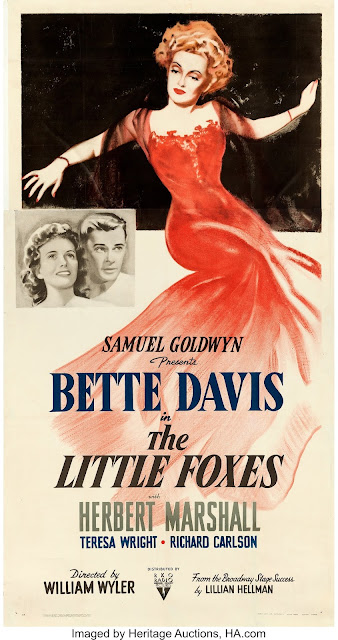That’s pure speculation, of course. But we know that Lillian Hellman’s The Little Foxes has been a stage perennial since it debuted on Broadway in 1939, headed by Tallulah Bankhead. There’ve been five Broadway productions in all, the last in 2017, with Laura Linney and Cynthia Nixon alternating in the roles of the cold-blooded Regina Giddens and her fragile sister-in-law, Birdie Hubbard. When the play was transformed into a film in 1941, most of the Broadway cast held onto their roles. But film director William Wyler decided that the star of two of his earlier film triumphs should anchor the movie. So Bette Davis, a great admirer of Bankhead’s stage performance, wrestled with ways to make the role her own. Though Bankhead had hinted that Regina was a victim as well as a villain, Davis went for the jugular. It was apparently her idea (decried by Wyler) to coat her face in white powder to give her character a spectral, almost Kabuki-like, look. The result: a woman you love to hate.
Seeing the film for the first time, I was delighted by its old-fashioned craftsmanship. Having recently suffered through some arty contemporary dramas in which you’re never quite sure who’s doing what or why, I appreciated the solidity of the film’s sets and performances. The Little Foxes, which reflexes the grotesque money-grubbing in Hellman’s childhood home, takes place in a small Southern town where everyone is always impeccably dressed and groomed. The screen adaptation (by Hellman herself, with some Dorothy Parker additions), is highly literate, and does a good job of breaking free of the gussied-up parlor that’s the play’s single setting. Instead we see something of the town, something of Regina’s shady veranda, something of the train that takes daughter Alexandra to fetch her father home as a way to serve Regina’s devious purposes. As for the cinematography, suffice it to say that the camera team was led by Gregg Toland, who shot Citizen Kane.
Though the film is definitely a period piece, made 80 years ago to reflect small-town life at the start of the 20th century, some aspects of it still seem current. Near the very end, when Regina has conclusively one-upped the smarter of her two brothers, he bears no grudge. Instead Charles Dingle as Ben Hubbard essentially congratulates Regina, saying, “The world's open for people like you and me. There's thousands of us all over the world. We'll own the country some day. They won't try to stop us. We'll get along.” I wish those words didn’t sound quite so contemporary.


Dear Professor (a VERY high compliment) Gray, OK, I read your beautifully written, illuminating and insightful piece and I was compelled (that’s me) to do extensive research on the innumerable interesting things things you mentioned. Now I’ve got a better and deeper understanding of Hellman (and Hammett). Got a more thorough theatrical understanding of “The Little Foxes,” including the biblical origin of the title (also didn’t know there was a “the” in the title). I see how Bette made it her own (I’d only heard terrible things about Bankhead), AND, now I want to see Fort Apache after reading that it is VERY kind to our Native-Americans and is really about the battle of The Little Big Horn. And Henry’s the bad guy and The Duke (who I detest) was the guy with heart and respect! My Lord! Not surprised to hear about Nichols’ sensitivity, read a great biography of him. So, two more movies to watch-Foxes and Apache. Once again, you’ve gifted me. Now it’s off to YouTube. Bless. Bob
ReplyDeleteBob, it's always a pleasure to hear from you. I LOVE your enthusiasm for movies and for my writing. I too need to see Fort Apache. Looking forward to your report!
ReplyDelete